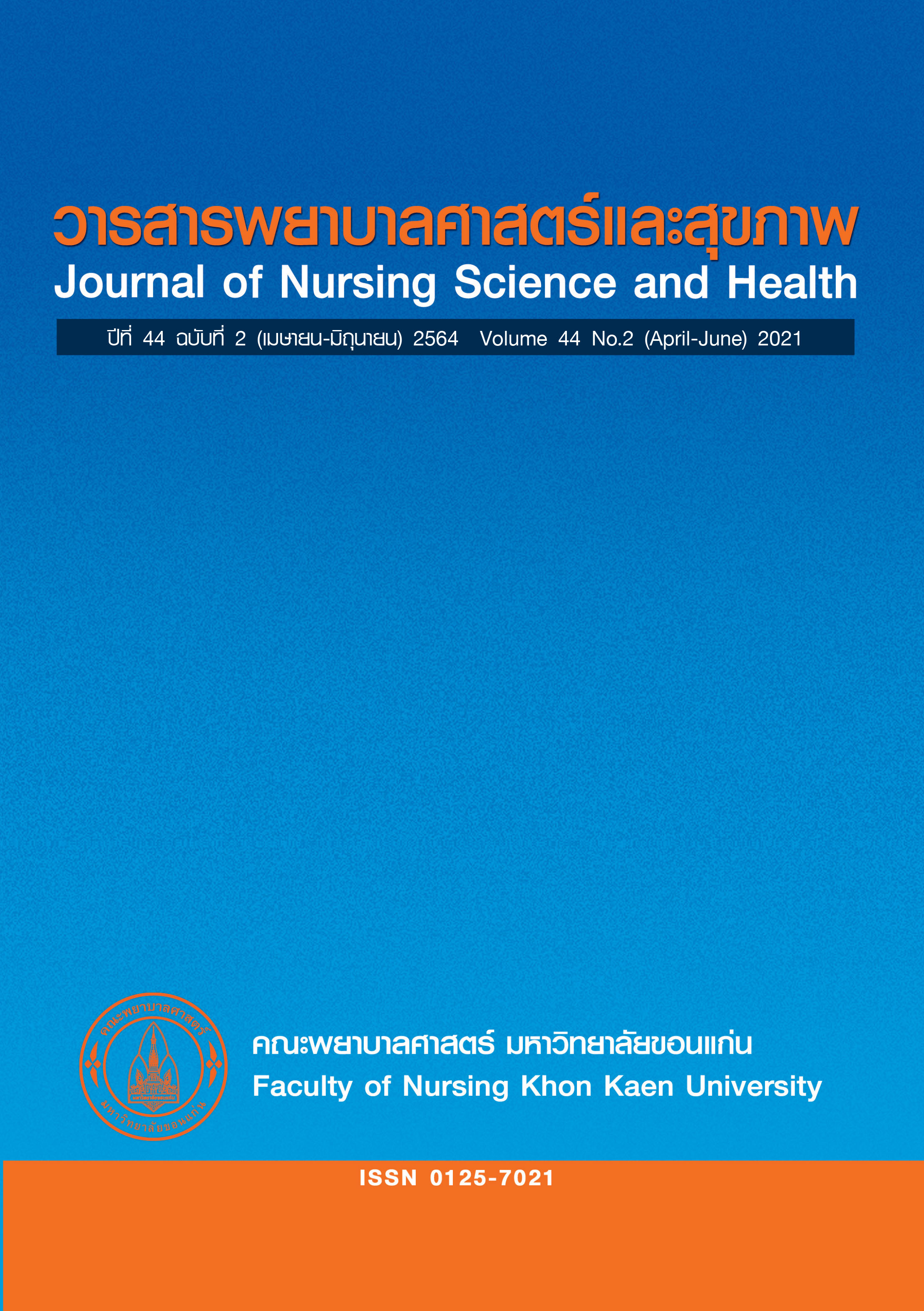ความต้องการและการได้รับความรู้และการสนับสนุนของผู้ป่วยมะเร็งระยะลุกลามและญาติผู้ดูแล
คำสำคัญ:
ความต้องการความรู้และการสนับสนุน, ผู้ป่วยมะเร็งระยะลุกลาม, ญาติผู้ดูแลบทคัดย่อ
การวิจัยเชิงบรรยายนี้มีวัตถุประสงค์เพื่อศึกษาความต้องการความรู้และการสนับสนุน และการได้รับความรู้และการสนับสนุนของผู้ป่วยมะเร็งระยะลุกลามและญาติผู้ดูแล โดยใช้ทฤษฎีการพยาบาลของโอเร็มเป็นกรอบแนวคิด กลุ่มตัวอย่างเป็นผู้ป่วยมะเร็งระยะลุกลามและญาติผู้ดูแลจำนวนกลุ่มละ 213 คน เก็บข้อมูลโดยใช้แบบสอบถามข้อมูลส่วนบุคคลและแบบสอบถามผู้ป่วยและญาติผู้ดูแลเกี่ยวกับความต้องการและการได้รับความรู้และการสนับสนุน ซึ่งมีค่าดัชนีความตรงเชิงเนื้อหาเท่ากับ 0.86 และสัมประสิทธิ์อัลฟ่าของครอนบาคเท่ากับ 0.92 วิเคราะห์ข้อมูลด้วยสถิติเชิงบรรยาย Wilcoxon Signed Rank test และ Mann Whitney U test
ผลการวิจัยพบว่า ความต้องการและการได้รับความรู้และการสนับสนุนโดยรวมของผู้ป่วยอยู่ในระดับปานกลาง เมื่อทดสอบทางสถิติ พบว่าไม่แตกต่างกัน (Z = -.382, p = .703) โดยพบว่าผู้ป่วยมีความต้องการด้านความรู้ คำแนะนำและการสนับสนุนทางด้านจิตใจอยู่ในระดับสูง และได้รับความรู้ คำแนะนำและการสนับสนุนทางด้านจิตใจสูงเช่นกัน ส่วนความต้องการและการได้รับความรู้ของญาติผู้ดูแล พบว่าความต้องการโดยรวมอยู่ในระดับสูง โดยเฉพาะด้านความรู้และคำแนะนำ ในขณะที่การได้รับความรู้และการสนับสนุนโดยรวมอยู่ในระดับปานกลาง เมื่อเปรียบเทียบความต้องการกับการได้รับโดยรวมพบว่าได้รับความรู้และการสนับสนุนน้อยกว่าที่ต้องการอย่างมีนัยสำคัญทางสถิติ (Z = -12.652, p < .001) แต่การได้รับความรู้และการสนับสนุนของผู้ป่วยและญาติผู้ดูแลไม่แตกต่างกัน (p > .05)
เอกสารอ้างอิง
Orem DE. Nursing concept of practice. 6th ed. Missouri: Mosby, Inc; 2001.
Methipisit P, Namvongprom A, Pakdevong N. Outcomes and process of palliative care in patients with advanced cancer. Journal of Nursing Science & Health 2018;41(1):75-83. (in Thai)
Chaichompoo R, Namvongprom A, Pakdevong N. Distress and quality of life among family caregivers of patients with advanced cancer undergoing chemotherapy. Journal of Nursing Science & Health 2017;40(4):41-9. (in Thai)
Makmai S, Sirichayanugul C, Sirichayanugul T. Common symptoms and needs of pre- discharge advanced stage cancer patients: A case-study at Phrae hospital, Thailand. Thai Cancer Journal 2013;33(4):132-45. (in Thai)
American Cancer Society. Advanced cancer [Internet]. Atlanta: American Cancer Society; 2017 [updated 2017; Cited 2017 May 17th]. Available from https://www.cancer.org/acs/ groups/cid/documents/webcontent/003082-pdf.pdf
Kim Y, Given BA. Quality of life of family caregivers of cancer survivors: Across the trajectory of the illness. CANCER supplement 2008;112(11):2556-68. Doi 10.1002/cncr. 23449
Family caregiver alliance. Caregiving 101: On being a caregiver [Internet]. San Francisco: Family caregiver alliance; 2014 [updated 2014; Cited 2017 May 17th]. Available from http://www.caregiver .org/caregiving-101-being-caregiver
National Cancer Institute. Family caregivers in cancer: Roles and challenges (PDQ)-health professional version [Internet]. National cancer Institute; 2016 [updated 2016; Cited 2017 May 17th]. Available from https://www.cancer.gov/about-cancer/coping/family-friends/family-caregivers-hp-pdq#link/_28_toc
Cardoso F, Harbeck N, Mertz S, Fenech D. Evolving psychosocial, emotional, functional, and support needs of women with advanced breast cancer: Results from the count us, know us, join us and here & now surveys. The Breast 2016;28 :5-12.
Fletcher C, Chapman J, Fennell K, Wilson C. The information needs of adult cancer survivors across the cancer continuum: A scoping review. Patient Education and Counseling 2017;100(3):383-410.
Maguire R, Kotronoulas G, Simpson M, Paterson C. A systematic review of the supportive care needs of women living with and beyond cervical cancer. Gynecologic Oncology 2015;136(3): 478-90.
Paterson C, Robertson A, Smith A, Nabi G. Identifying the unmet supportive care needs of men living with and beyond prostate cancer: A systematic review. Eur J Oncol Nurs 2015;19(4): 405-18.
Longacre ML. Cancer caregivers information needs and resource preference. J Cancer Educ 2013;20(2):297-305. Doi 10.1007/s13187-013-0472-2.
Eriksson E, Lauri S. Informational and emotional support for cancer patients’ relatives.Eur J Cancer Care 2000;9(1):8-15. Doi 10.1046/j.1365-2354.2000.00183.x
Bee PE, Barnes P, Luker KA. A systematic review of informal caregivers’ needs in providing home-based end-of-life care to people with cancer. J Clin Nurs 2009;18(10):1379-93. Doi 10.1111/j.1365-2702.2008.02405.x.
Yodying T, Namvongprom A, Pakdevong N. Educative-supportive care needs in patients with advanced cancer undergoing chemotherapy. Journal of Nursing Science & Health 2019;42(4):10-9. (in Thai)
Marzorati C, Bailo L, Mazzocco K, Pravettoni G. Empowerment from patient’s and caregiver’s perspective in cancer care. Health Psychology 2018;5(2):1–7. DOI: 10.1177/2055102918815318
ดาวน์โหลด
เผยแพร่แล้ว
รูปแบบการอ้างอิง
ฉบับ
ประเภทบทความ
สัญญาอนุญาต
วารสารพยาบาลศาสตร์และสุขภาพเป็นเจ้าของลิขสิทธิ์ในการเผยแพร่ผลงานที่ตีพิมพ์ห้ามผู้ใดนำบทความที่ได้รับการตีพิมพ์ในวารสารพยาบาลศาสตร์และสุขภาพไปเผยแพร่ในลักษณะต่าง ๆ ดังนี้ การนำบทความไปเผยแพร่ออนไลน์ การถ่ายเอกสารบทความเพื่อกิจกรรมที่ไม่ใช่การเรียนการสอน การส่งบทความไปตีพิมพ์เผยแพร่ที่อื่น ยกเว้นเสียแต่ได้รับอนุญาตจากวารสารพยาบาลศาสตร์และสุขภาพ



